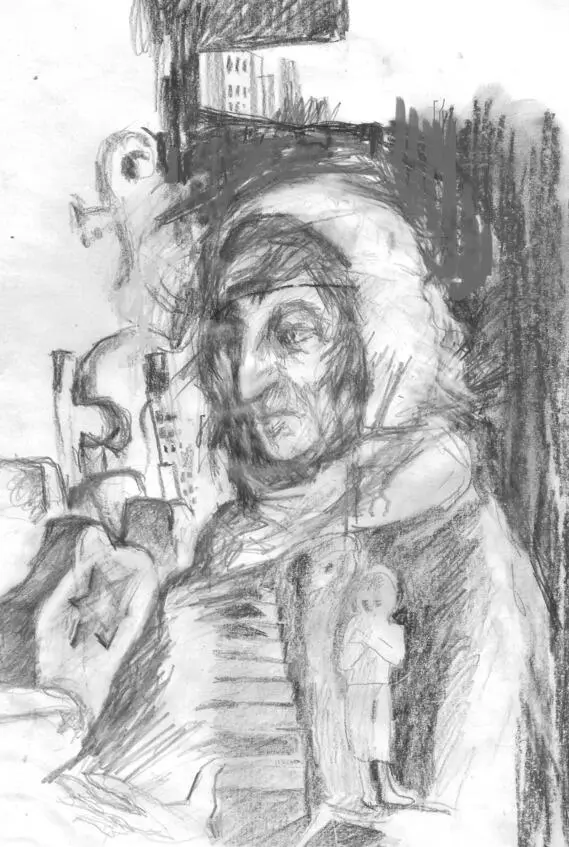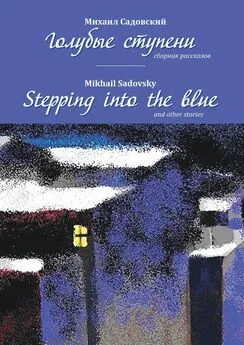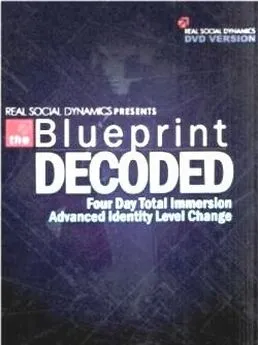Mikhail Sadovsky - Голубые ступени / Stepping into the blue
- Название:Голубые ступени / Stepping into the blue
- Автор:
- Жанр:
- Издательство:неизвестно
- Год:неизвестен
- ISBN:9785005321114
- Рейтинг:
- Избранное:Добавить в избранное
-
Отзывы:
-
Ваша оценка:
Mikhail Sadovsky - Голубые ступени / Stepping into the blue краткое содержание
Голубые ступени / Stepping into the blue - читать онлайн бесплатно ознакомительный отрывок
Интервал:
Закладка:
«But he’ll still need it!» He couldn’t see how he could refuse.
She protested against the approaching separation with her whole being, tense and super-sensitive as it was. She had no idea how she would live or what she would do. The main thing was not to make a spectacle of her feelings, and not to impose herself, so that he would not suffer on her account. That would never do! But without him? Without him – what would she ever do without him? Such a thought was unreal! For her there simply could never be a ’without him’.
But nobody could possibly have predicted the way it actually turned out.
All the members of the graduating class (and there weren’t that many of them) were handed their assignments – she was detailed to work on the Conservatory’s own academic journal. Everyone received an assignment, except for him.
«You are so talented, you have a such a special profile, that we can’t assign you a place just yet!» an official at the ministry told him with a supercilious smile. He was crushed. No matter what he did now, no matter where he looked for work, he would still not have his degree, since the degrees were awarded only after the work assignments. A vicious circle!
She gave an involuntary shiver at the memory of it. Still, it meant they could continue to see each other every evening. But then along came the «Doctors’ plot». 4 4 The Doctors’ plot (in Russian: delo vrachej – literally, «the doctors’ case») – a supposed plot by a number of doctors (many of them Jewish) to kill Stalin, widely held to be a ruse perpetrated by Stalin himself. All the doctors were freed a few days following Stalin’s death in March 1953.
They had spoken earlier about his Jewish background (she herself knew what it was like to be an outcast after her own father was taken) – there had been insults and fears in great supply, but now it became even physically frightening, perhaps because they were beginning to understand more as they advanced in years, or perhaps it was true that nothing quite so frightening had happened before. The word Jew had been turned into a stigmatizing label. A curse. One thing was clear: no work now meant certain death – no internal identity documents.
So she took to making telephone calls. She canvassed her friends. And acquaintances. Even acquaintances of acquaintances.
«Irochka,» they would ask her. «Who are you making such a fuss about? Don’t you have a good position?» And when they found out who it was she was trying to assist, the conversation would end. But still…
«Maybe it’s a miracle,» she thought, when things finally did work out. «Maybe it’s true that I got help from heaven!» And back at home she secretly kissed the little cross she kept underneath a slip of paper at the bottom of a jewelry box.
She had been afraid at first (though needlessly) that he might object to the placement she had obtained for him. After all, with a first-class honours degree from the Moscow Conservatory how could he stoop to teaching kids in a music school? She smiled. And now four years had gone by already and he didn’t even want to leave.
She looked at her watch. Time to go.
She wasn’t concerned. She didn’t hurry. She didn’t even think about it – she forced herself not to think about what would happen in the future, ever since she realized that whatever happened she couldn’t live without him. The important step had already been taken: she had found a professor who was willing to operate on her. That had proved very difficult. Extremely. One chance in ten – to be three centimetres taller and straighter.
She looked up at the sun – the cloud had moved on, and in her head there were no more trite words, such as «everything will turn out all right».
«Good timing!» she only thought. «He’ll be away for a week. I’ve written Mama a note. Everything’s been taken care of.
«Mama, mama… She was always telling me: „Remember, Irka, 5 5 Both Irka and Irochka are diminutive forms of the name Irina, each befitting the respective context.
once you fall in love you’ll lose everything. You’re just like me, you can’t do anything half-way in life.“ Oh, Mamochka, Mama!»
She slipped her fingers under the broad belt across her chest, gave her shoulder a shake to adjust her bag, and this brought her back with a jolt. The steps ahead of her had become simply wet, and people had every reason to go quite calmly up and down them without noticing anything. From the moment she realized she loved him she had known she would be taking this step, and she would carry through. She would take this step, whether he was faithful to her or not – for her there was no other choice.
She closed her eyelids for a moment, then raised her leg and stepped into the ’sky’, its blueness now completely shattered. Her footsteps – one, two, three – left wet imprints in the snow-slushy water, which once more resumed its downward course, reflecting the sky. Everything looked as it did before. Did it make any difference to the steps, the water or the sky who their disturber was or why?

Девяносто
Девяносто – это девяносто. Цифра сама по себе всегда пуста, но если твоей бабушке девяносто и она называет тебя «мальчик», а тебе сорок, то есть о чём подумать – сколько уместилось в эту цифру.
– Так, может быть, ты не пойдёшь сегодня в синагогу? Смотри, какая погода.
– Ничего. Погода здесь ни при чём. В моём возрасте нельзя останавливаться. Я ни разу не пропустила, так что сегодня за праздник? С тех пор, как в синагогу стало опасно ходить, я ни разу не пропустила. Когда мужчины стали бояться ходить, так пошла я.
– А ты не боялась?
– Что они мне сделают? Должен же кто-то ходить в синагогу. А то они могли сказать, что раз никто не ходит, так она не нужна, ты что, не понимаешь?!
– Бабушка, как у тебя развито общественное сознание, ого! И что ты просила у Него, чтобы не закрыли синагогу?
– Я никогда ничего не просила. У Него не надо просить ничего.
– Но все просят! И русские в церкви, и татары в мечети, и евреи…
– Нет. Ничего просить не надо. Я рассказываю Ему, что да как, чтобы Он знал правду. А Он уж сам знает, что делать…
– И как ты карабкаешься туда наверх по лестнице…
– Ничего. Понемножку. Но ближе к нему, так Он лучше слышит… я же не кричу… я Ему могу и здесь рассказать… Он всё равно услышит… но, знаешь, я думаю, Ему приятно, что я столько лет хожу в синагогу…
– И всё одно и то же, одно и то же…
– Мальчик, солнце тоже встаёт и садится, а люди родятся и умирают, а деньги приходят и уходят… станешь старше – поймёшь…
– О чём ты, бабушка? Мне сорок!
– Это не тебе сорок – это мне девяносто. Я никогда не просила Его. Бывало так, аж… а фарбренен зол алц верн… дос их хоб гемейнт… ду форштейст, ду форштейст алц… унд их хоб герехнт – дос из а с??…оф… 6 6 Чтоб оно всё сгорело… так я думала… ты понимаешь, ты всё понимаешь… и я решила тогда – это конец…
Но Он решил, что нет…
– Бобе, майне таере бобе! Их бет дир, леб нох а гундерт ёр! 7 7 Бабушка, моя дорогая бабушка! Я прошу тебя, живи ещё сто лет!
– Ты хитрый! Ешефича!.. Ты всё хочешь быть молодым… нет, нет… и хватит об этом… я всё равно не поеду на твоей машине… а если ты мне разменяешь рубль по десять копеек, то я смогу всем дать у входа…
Она собралась потихоньку, в отдельный затрёпанный кошелёчек с кнопочкой посредине сложила разменянный рубль, в карман длинной чёрной юбки засунула другой кошелёк, потолще и побольше размером, натянула старое, но вполне приличное и не засаленное, как обычно у старух, пальто, далеко не закрывавшее юбку, проверила ключи… после этого взяла самодельную можжевеловую очень удобную палку с длинной загнутой ручкой, на которую можно было опереться даже локтем, и вышла из двери.
Девяносто ей исполнилось два месяца назад. Пышно это событие не справляли. Но все соседи откуда-то узнали, и оно почему-то стало событием и для них. Приходили. Звонили в дверь и поздравляли, хотя могли это сделать и во дворе… но приходили… она не то чтобы дружила с ними, с соседями, но когда знала, что кому-то из них плохо, шла и просто помогала, а не спрашивала, надо ли помочь… ещё когда молодая была… она же тут уже не один десяток лет живёт на этом самом месте. У них забирали мужей, она не боялась позвонить в дверь… а забирали обоих родителей, так не боялась пойти покормить оставшихся детей… а когда у неё случилась беда и никто не позвонил в дверь, а на улице, чтобы не обидеть, переходили на другую сторону и не здоровались, она не обижалась… люди есть люди… одни так живут, другие – так… «Сколько мне тогда было? Шестьдесят? Ну, чего можно бояться в шестьдесят? Я же не знала, что проживу до девяноста!» Она не любила вспоминать всё подряд – «валить в кучу», а если вспоминала что-то, то так подробно, будто это происходило сейчас, и она просто пересказывает слепому, чтобы он знал…
Читать дальшеИнтервал:
Закладка:










